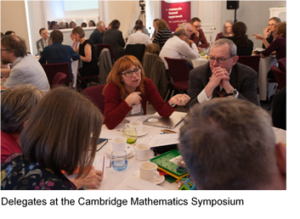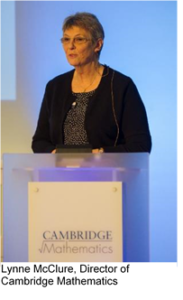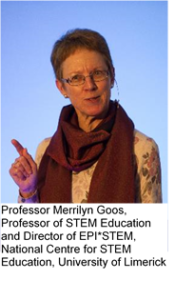Cambridge Mathematics responds in a practical way

Over 50 representatives from the international mathematics community convened at the British Academy in London on Wednesday 21 March for the Cambridge Mathematics Symposium to hear a progress update on a new mathematics framework that is being developed. The roundtable event also brought together delegates from organisations including UCL Institute of Education, Ofqual and top universities around the country to discuss and debate important issues and innovations affecting mathematics education both in the UK and abroad.

The event was facilitated by Cambridge Mathematics, a collaborative enterprise dedicated to providing an internationally recognised, quality mathematics education, and the team delivered the opening remarks at the event.

Lynne McClure, Director of Cambridge Mathematics, said: “This roundtable event was our opportunity to bring together many of the colleagues who have supported us thus far, to present our progress to date and to engage in discussions about the next part of our journey. Ultimately, we intend that the Cambridge Mathematics Framework will connect the four key elements of mathematics education: curriculum, resources, professional development and assessment. We have built the beginnings of a multi-dimensional, connected structure influenced by theoretical perspectives, international evidence and empirical research, whilst keeping an eye on what new mathematics could be incorporated into a framework fit for the 21st century.”
Simon Lebus, Group Chief Executive, Cambridge Assessment, reflected: “Maths capability is not up to scratch and we need to consider how we can respond in a practical way. Fantastic progress has been made by the Cambridge Mathematics team on this – partly because of Lynne and her team but also thanks to their interaction with the maths community. The maths community’s presence at the Symposium is a symptom and reflection of the collaborative nature of the initiative.”
The Cambridge Mathematics Framework is being designed as a common frame of reference for learning mathematics. Its purpose is to inform the work of the professional communities designing and enacting mathematics curricula. In particular, it will support designers and teachers to make use of the connected nature of the mathematics learning domain.
Three key themes linked to the development of the Framework were addressed at the Symposium:
Curriculum
Delegates were joined by colleagues from Mauritius via video conference for discussion around the first theme, Whose curriculum is it anyway?. A roundtable discussion followed keynote speeches from Professor Geoff Wake, Professor of Mathematics Education, University of Nottingham and Tony Gardiner, research mathematician, who considered how our individual experiences and values interact to define our views of what mathematics is and what a shared framework might look like.
Digital
Zsolt Lavicza joined the conversation from Austria for the second session Digital maths - always an improvement? and Dr Alison Clark-Wilson, Principal Research Associate, UCL Institute of Education and Professor Merrilyn Goos, Professor of STEM Education and Director of EPI*STEM, National Centre for STEM Education, University of Limerick, addressed the challenges and opportunities around digital maths in more detail.
Dr Clark-Wilson said: “Technology issues used to be about access; now they are more about the steep learning curve for teachers around accessing the pedagogical and mathematical ideas made possible by the technology - those aren't included in the instructions! It is critical that design principles for the use of the technology align with the conditions in schools. Why should teachers adopt new technology when the high stakes assessments their students sit really don’t build upon or fit that learning experience?”
 Professor Merrilyn Goos commented: “The very first International Commission on Mathematical Instruction (ICMI) Study in 1985 was about digital technologies in mathematics education, and it presented an optimistic vision for future development. Twenty years later, the 17th ICMI Study (2006) revisited this same topic, with the realisation that change had proceeded more slowly than anticipated. In particular, we know now that large scale integration of digital technologies into mathematics education is a major challenge. At the time of the first ICMI Study, research focused on the technology itself and its mathematical potential, as well as on student cognition. What was missing was inquiry into teachers’ practices, institutional contexts, and curriculum change.”
Professor Merrilyn Goos commented: “The very first International Commission on Mathematical Instruction (ICMI) Study in 1985 was about digital technologies in mathematics education, and it presented an optimistic vision for future development. Twenty years later, the 17th ICMI Study (2006) revisited this same topic, with the realisation that change had proceeded more slowly than anticipated. In particular, we know now that large scale integration of digital technologies into mathematics education is a major challenge. At the time of the first ICMI Study, research focused on the technology itself and its mathematical potential, as well as on student cognition. What was missing was inquiry into teachers’ practices, institutional contexts, and curriculum change.”
Assessment
The third session of the day addressed How does assessment detract or contribute to the coherence and connectedness of the maths curriculum?. Professor Andy Noyes, Head of School of Education, University of Nottingham and Jane Jones, Former National Lead for Mathematics, Ofsted, deliberated on this point considering mathematical connections in high stakes assessment as well as making the most of low stakes assessments.
Reflecting on high stakes assessment Professor Andy Noyes commented: “High stakes assessments don’t do much to assess mathematical connections. We really need to think about the professional development of examiners – not just teachers. Consideration needs to be given to how we support those people writing assessment items and what we need to do to help write good assessment items.”
Commenting on low stakes assessment, Jane Jones said: “The clues that teachers pick up in the classroom should inform how the teaching then moves on. Teachers can make decisions about how teaching is adapted, for example, if misconceptions arise, teaching should be adapted to remove that misconception. The whole curriculum is not about ‘pages of stuff’ (mathematical content), it’s about the aims of the curriculum. We need to equip students for their future lives mathematically.”
Peter Phillips, Chief Executive at Cambridge University Press, brought the day to a close: “I started off as a mathematician myself which has made me a really passionate supporter of maths education. The discussions today have illustrated that even if the pace of digital transformation in the classroom may be slower than many predicted, the scale of long term change may be even greater. The shared mission of the four parts of the University of Cambridge who established this project and their unique breadth of experience – from curriculum design and learning materials to teacher support and mathematical insight – is giving the Cambridge Mathematics team the means to turn the insights from their work into practical impact for teachers and students around the world.”
Lynne McClure, Director of Cambridge Mathematics, concluded: “We have been fortunate to have met and engaged with colleagues who have been generous with their time and expertise and who have advanced our thinking in a way that we could not have achieved independently. We felt that now was the time to share the progress we have made so far, the questions which are still intriguing us, and to invite still further challenge, support and discussion on our continuing work. This event has provided valuable insight to our continuing development of the Framework.”
Further information on the Cambridge Mathematics Framework can be found here: https://www.cambridgemaths.org/images/cambridge-mathematics-symposium-2018-framework-update.pdf

